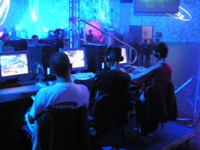 The reaction of many parents and educators to the idea of playing games in school is horror. School is supposed to be serious hard work. What these people don’t know is that in modern video games doing tasks repetitively to slowly build skills and status is the norm not the exception. These games are all about “hard” play.
The reaction of many parents and educators to the idea of playing games in school is horror. School is supposed to be serious hard work. What these people don’t know is that in modern video games doing tasks repetitively to slowly build skills and status is the norm not the exception. These games are all about “hard” play.
Gamers have a term for this – grinding. Grinding is spending two months getting your mining skills up so that you can make a special suit of armor for your friends. Grinding is repeatedly doing some menial chore for a faction so you can earn status with them and get access to skills they can teach you.
Educators also have a term of art for this kind of activity – they call it building fluency. We learn most of the hardest skills in life through a slow process of accretion that amounts to building fluency. According to reading experts a child needs to read several million words in order to become a fluent reader.
Accelerated Reader is essentially a game about reading that is a long steady grind. Like a game you get rapid feedback, frequent promotions, and status from completing the tasks. It didn’t get to be “the world’s most widely used reading software” by mistake.
 But the concept of fluency goes far beyond reading. Learning to play an instrument, writing, using a knife, flirting, skateboarding and thousands of other human activities all share the need to grind it out over time to develop that effortless fluency that is the mark of an expert.
But the concept of fluency goes far beyond reading. Learning to play an instrument, writing, using a knife, flirting, skateboarding and thousands of other human activities all share the need to grind it out over time to develop that effortless fluency that is the mark of an expert.
This raises the question of why a child would engage in the grind to fluency? My theory, based on gamer culture, is that it is a critical part of building identity. Players will do routine and menial tasks over and over again to build the story line of their character in the game. It is a fundamental building block of identity – if it was easy there would be no status associated with becoming fluent.
How does this apply to school? Many (not all) low performing students don’t have a story thread in their lives that helps motivate them to grind in school (doing homework). Students who are high achievers generally have a story line that is central to their identity that gives the grind meaning and a purpose. Without that story line much school work is just tedium.
If this is true (a big if) what is role of publishers in helping educators and parents guide students to the stories that will motivate them? I believe our role is to bring new tools and approaches to bear that have more story embedded in them, stories that students can appropriate and make their own as they build their identity.
If you want clues on how to do that – you only need to head down to your local Game Stop.
 The Education Business Blog
The Education Business Blog

